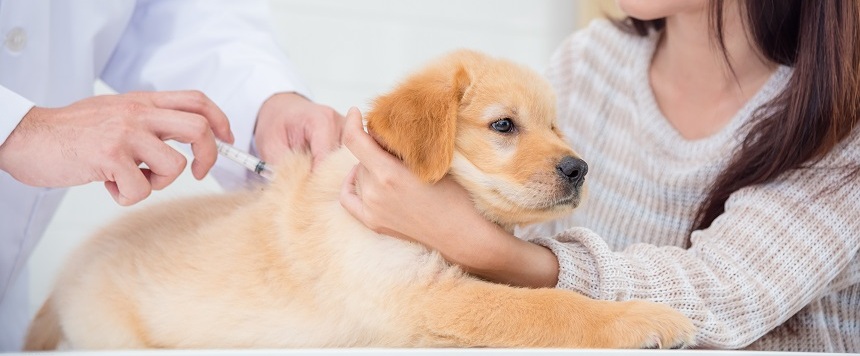🔥NEW🔥 PETHELP+ insurance is now available. Check here or call 📞 790 277 277
Additional vaccines are those that are recommended but not mandatory for a particular animal if there is a significant risk of contact with a specific infectious pathogen. One example of such a vaccination is the leptospirosis vaccination.
This service is available in Pethelp packages. Package prices start at 99 PLN/month.
Check
Leptospirosis is a disease caused by bacteria, often known as spirochetes. Their name derives from their serpentine shape. Because these bacteria can migrate, they quickly spread via the circulatory system to multiple organs, such as the lungs, liver, and kidneys, after entering the animal's body. They can be detected in urine a few days after infestation and then released into the environment, where they can infect other animals and humans.
Because leptospirosis is a contagious disease that can be transmitted to humans, it is vital to remember about protection whenever you come into contact with a sick animal. Wear gloves when handling pet urine, and sanitize any surfaces that have come into contact with the pet's urine.
Leptospirosis is becoming more widespread in our climate zones, particularly in shallow, stagnant waters such as puddles, small ponds, and pools. Due to the difficulty of diagnosing the disease and the possibility of an acute course, it is worthwhile to vaccinate your dog in order to minimize symptoms of probable infection after contact with bacteria.
From the age of 12 weeks, puppies can be vaccinated against leptospirosis. Adult dogs and puppies should be vaccinated twice, three to four weeks apart, and then annually if the animal is regularly exposed to the bacteria. The veterinarian determines the precise vaccination dates following a clinical examination of the patient.
Vaccination is not recommended if the dog is in poor health. If your pet is lethargic and has a confirmed infection, inflammation, or known immunological deficiencies, vaccination should be avoided. In this case, you should take your pet to the vet for a checkup and to schedule a new vaccination date.
This vaccination should not be administered to a puppy under the age of six weeks. Maternal antibodies protect the majority of animals after birth. These antibodies destroy the antigens in the vaccine and prevent post-vaccination immunity from developing. Animals with weakened immunity and without mothers may become more susceptible to diseases earlier; thus, each case should be evaluated carefully by a veterinarian.
If you have observed any unusual medication reactions in your pet or suspect that they may occur, please notify your veterinarian during your visit!
Vaccination includes a vaccination qualifying visit, one dose of the vaccine, and administration of the vaccine. During such a visit, the veterinarian will perform a clinical examination and check the dog's immunological status. If no contraindications exist, the doctor will administer the proper dose of the medication. The doctor may use any commercially available product. Preparations containing antigens from numerous Leptospira spp. serovars are available; most often, they are L. icterohaemorrhagiae, L. canicola, L. grippotyphosa, and L. bratislava.
After the vaccine, the veterinarian will ask you to stay at the clinic for 15 minutes to check for any possible allergic reactions. Swelling, which may or may not be in the area of the body where the preparation was injected, redness, scratching, or sudden weakening of the pet may suggest an inappropriate vaccination reaction. If you see any of these signs, notify the veterinarian as soon as possible.
The visit should conclude with the veterinarian entering the following information in the pet's health book:
Please keep in mind that protective immunity develops approximately 21 days after vaccination!
FAQ
Leptospirosis vaccination for dogs costs between 65 PLN and 90 PLN. Each veterinary institution sets its own fees, so ask about the cost of a specific service before your pet's visit.
A visit to the veterinarian facility including vaccine administration, normally takes around 30 minutes.
You should bring your pet to the vaccination appointment with no concerning symptoms, a health booklet, and information about any unusual medication responses. To retain full protection against diseases that are dangerous to your dog, you should schedule an appointment well in advance, keeping in mind that it takes around 14 days for your pet to develop immunity after vaccination.
Do you have any other questions?
All listed services are available in PETHELP packages.